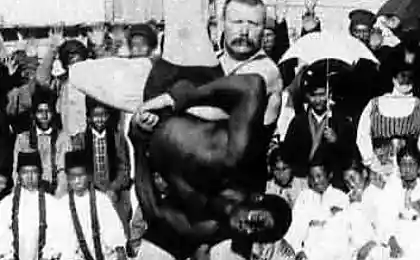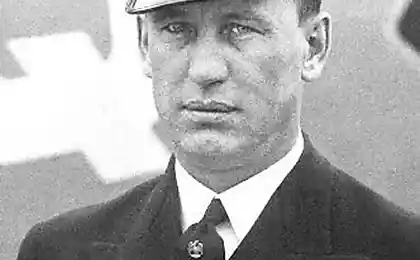478
If you want to make, don't repeat my mistake!
I'll be honest with you. This article will tell error, which I, in my life, has made about twenty billion times. This is approximate calculations. The margin of sampling error is plus or minus a hundred thousand times.
In most cases, I did not reach their personal goals. Half way through lost interest and turned off the road.
It was a mistake that I came again and again. Each time he was surprised by the bruises on his forehead, but the mind is no longer felt.
I absolutely are not aware of the ineffective behavior, which did not allow me to follow through. And so it was for many years. Until then, until I myself held a session of psycho, which is called Pure Space.
During the session, I discovered the unconscious stereotyped behavior, which was making all my endeavors. A little later I noticed that such behavior is common to most people.
I'm not going to speak for everyone. There are people who know about this error and do the right thing. And they achieve personal goals. They bring it started to end.

“Personal goals is for everyone”
To lose weight. To learn English. To create a computer game. Learn to play the guitar. Going to the gym. To write a book. To run every morning. To master the blind typing method. To travel. Photography. To open the business. Produce podcasts or keep a personal blog.
All of the above relates to personal goals.
Every time I set a new personal goal, I shared this news with friends, parents and work colleagues. I told them they were going to do so-and-so. Or reported that has already started to do.
Also, I noticed that most have achieved the goals which I never told anyone.
“An interesting experiment”
I decided to search the Internet, and was re-discovered America! German psychology Professor Peter Gollwitzer studying this phenomenon for more than 15 years. He once conducted an interesting experiment.
As experimental mice Gollwitzer selected a group of law students of the University. The purpose of the experiment: to find out whether public statements about their intentions for the achievement of personal goals.
For this, Gollwitzer has compiled a list of statements like: “I'm going to take from legal education”, “I'm going to become a successful lawyer” and so on. Each of the representations the students had to rate on a scale from “strongly agree” to “strongly disagree”.
The survey was conducted anonymously. If you want, you can write your name. Also, in the questionnaires students were asked to list three specific things that they are going to do to become a successful lawyer.
Typical answers were: “I intend to regularly read the legal periodicals” or something like that.
When the students took the questionnaire, Peter Gollwitzer found that most students answered the questions and signed her name. Some even did not fill in the questionnaires and kept their intentions secret.
“Those who kept their intentions secret...”
The students were unaware that their intentions would be tested. They have handed in their questionnaires and forgot about it. But researchers led by Peter Gollwitzer something to think about...
Psychologists waited for some time, and then artificially created a situation to test respondents “for lice.” They asked the students to help them in the project, which required analysis of twenty criminal cases.
The students said that they have to work as hard as I can. At the same time, everyone has the right to “score” and leave at any time.
The criminal case was difficult. They demanded the inclusion of brain to the fullest and perseverance.
The results of the experiment were unequivocal.
Everyone who publicly announced in the form, indicate your intentions for the future, “blended” with work. They shied away from reaching this goal. This is despite the commitment to build a career in law!
Only those who kept his hopes to himself, unable to do hard work and follow through.
“Why do people tell others about their intentions?”
The gollwitzer believes that it is related to the sense of identity and integrity.
We all want to be perfect people. But the statements about our intentions hard and work hard often are purely symbolic act. It just helps us define themselves in their role. For example: “I'm a lawyer” “I am writer”, “I'm a photographer” “I am programmer”.
But the insatiable Peter Gollwitzer conducted another experiment to further verify the correctness.
Students were shown five photos of the Supreme court. The pictures have different sizes. From very small to very large. Subjects were asked: “How do you feel the cool lawyer now?”
Test subjects were asked to rate their coolness and to answer the question by selecting one of five pictures. What a great photo you select, the more complete I feel.
No one was surprised when the students, who had previously stated its goals and has failed in practice, were inclined to select more photos.

Ellen Henriksen: learn to refuse without feeling guilty
Guarantees of success no. Do what you like
Even only one statement about his plans of becoming a good lawyer made them feel like they were good lawyers.
This increased their self-esteem, paradoxically reducing their ability to hard work. They become legends in your mind. And legends do not make dusty and dirty work.
"The continuation..."
Now it is time to understand WHY the praise of unfinished business is ruining the motivation. What happens inside when a person declares about their aspirations of reaching the goal? published
Author: Ivan Pie
Source: www.ivanpirog.com/posts/esli-xotite-dostich-lichnuyu-cel/
In most cases, I did not reach their personal goals. Half way through lost interest and turned off the road.
It was a mistake that I came again and again. Each time he was surprised by the bruises on his forehead, but the mind is no longer felt.
I absolutely are not aware of the ineffective behavior, which did not allow me to follow through. And so it was for many years. Until then, until I myself held a session of psycho, which is called Pure Space.
During the session, I discovered the unconscious stereotyped behavior, which was making all my endeavors. A little later I noticed that such behavior is common to most people.
I'm not going to speak for everyone. There are people who know about this error and do the right thing. And they achieve personal goals. They bring it started to end.

“Personal goals is for everyone”
To lose weight. To learn English. To create a computer game. Learn to play the guitar. Going to the gym. To write a book. To run every morning. To master the blind typing method. To travel. Photography. To open the business. Produce podcasts or keep a personal blog.
All of the above relates to personal goals.
Every time I set a new personal goal, I shared this news with friends, parents and work colleagues. I told them they were going to do so-and-so. Or reported that has already started to do.
- ”By the way, I'm going to write a novel”
- ”My friends and write a computer game”
- ”I'm going to focus on your business”
Also, I noticed that most have achieved the goals which I never told anyone.
“An interesting experiment”
I decided to search the Internet, and was re-discovered America! German psychology Professor Peter Gollwitzer studying this phenomenon for more than 15 years. He once conducted an interesting experiment.
As experimental mice Gollwitzer selected a group of law students of the University. The purpose of the experiment: to find out whether public statements about their intentions for the achievement of personal goals.
For this, Gollwitzer has compiled a list of statements like: “I'm going to take from legal education”, “I'm going to become a successful lawyer” and so on. Each of the representations the students had to rate on a scale from “strongly agree” to “strongly disagree”.
The survey was conducted anonymously. If you want, you can write your name. Also, in the questionnaires students were asked to list three specific things that they are going to do to become a successful lawyer.
Typical answers were: “I intend to regularly read the legal periodicals” or something like that.
When the students took the questionnaire, Peter Gollwitzer found that most students answered the questions and signed her name. Some even did not fill in the questionnaires and kept their intentions secret.
“Those who kept their intentions secret...”
The students were unaware that their intentions would be tested. They have handed in their questionnaires and forgot about it. But researchers led by Peter Gollwitzer something to think about...
Psychologists waited for some time, and then artificially created a situation to test respondents “for lice.” They asked the students to help them in the project, which required analysis of twenty criminal cases.
The students said that they have to work as hard as I can. At the same time, everyone has the right to “score” and leave at any time.
The criminal case was difficult. They demanded the inclusion of brain to the fullest and perseverance.
The results of the experiment were unequivocal.
Everyone who publicly announced in the form, indicate your intentions for the future, “blended” with work. They shied away from reaching this goal. This is despite the commitment to build a career in law!
Only those who kept his hopes to himself, unable to do hard work and follow through.
“Why do people tell others about their intentions?”
The gollwitzer believes that it is related to the sense of identity and integrity.
We all want to be perfect people. But the statements about our intentions hard and work hard often are purely symbolic act. It just helps us define themselves in their role. For example: “I'm a lawyer” “I am writer”, “I'm a photographer” “I am programmer”.
But the insatiable Peter Gollwitzer conducted another experiment to further verify the correctness.
Students were shown five photos of the Supreme court. The pictures have different sizes. From very small to very large. Subjects were asked: “How do you feel the cool lawyer now?”
Test subjects were asked to rate their coolness and to answer the question by selecting one of five pictures. What a great photo you select, the more complete I feel.
No one was surprised when the students, who had previously stated its goals and has failed in practice, were inclined to select more photos.

Ellen Henriksen: learn to refuse without feeling guilty
Guarantees of success no. Do what you like
Even only one statement about his plans of becoming a good lawyer made them feel like they were good lawyers.
This increased their self-esteem, paradoxically reducing their ability to hard work. They become legends in your mind. And legends do not make dusty and dirty work.
"The continuation..."
Now it is time to understand WHY the praise of unfinished business is ruining the motivation. What happens inside when a person declares about their aspirations of reaching the goal? published
Author: Ivan Pie
Source: www.ivanpirog.com/posts/esli-xotite-dostich-lichnuyu-cel/



















